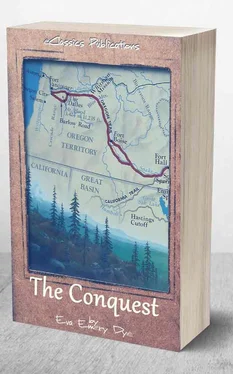The sultry sun scorched, the waters were low, provisions did not arrive until nine days after the soldiers, and then were spoiled. Fatigued, hungry, three hundred revolted and left; nevertheless, the Indians had fled and Vincennes was recovered.
Just then up the Wabash came a Spaniard with a boatload of valuable goods. Clark promptly confiscated the cargo, and out of them paid his destitute troops.
"It is not alone retaliation," said Clark, "It is a warning. If Spain will not let us trade down the river, she shall not trade up."
Kentucky applauded. They even talked of sending Clark against the Spaniards and of breaking away from a government that refused to aid them.
"General Clark seized Spanish goods?" Virginia was alarmed and promptly repudiated the seizure. "We are not ready to fight Spain."
Clark's friends were disturbed. "You will be hung."
Clark laughed. "I will flee to the Indians first."
"We have as much to fear from the turbulence of our backwoodsmen," said Washington, "as from the hostility of the Spaniards."
But at this very time, unknown to Washington, the Spaniards were arming the savages of the south, to exterminate these reckless ambitious frontiersmen.
Louisiana feared these unruly neighbours. Intriguers from New Orleans were whispering, "Break with the Atlantic States and league yourself with Spain."
Then came the rumour, "Jay proposes to shut up the Mississippi for twenty-five years!"
Never country was in such a tumult.
"We are sold! We are vassals of Spain!" cried the men of the West. "What? Close the Mississippi for twenty-five years as a price of commercial advantage on the Atlantic coast? Twenty-five years when our grain is rotting? Twenty-five years must we be cut off when the Wilderness Road is thronged with packtrains, when the Ohio is black with flatboats? Where do they think we are going to pen our people? Where do they think we are going to ship our produce? Better put twenty thousand men in the field at once and protect our own interests."
The bond was brittle; how easily might it be broken!
Even Spain laughed at the weakness of a Union that could not command Kentucky to give up its river. And Kentucky looked to Clark. "We must conquer Spain or unite with her. We must have the Mississippi. Will you march with us on New Orleans?"
Then, happily, Virginia spoke out for the West. "We must aid them. The free navigation of the Mississippi is the gift of nature to the United States."
The very next day Madison announced in the Virginia Assembly, "I shall move the election of delegates to a Constitutional Convention." The stability of the Union seemed pivoted upon an open river to the Gulf.
Veterans of the Revolution and of the Continental Congress met to frame a constitution in 1787. After weeks of deliberation with closed doors, the immortal Congress adjourned. The Constitution was second only to the Declaration of Independence. Without kings or princes a free people had erected a Continental Republic.
The Constitution was adopted, and all the way into Kentucky wilds were heard the roaring of cannon and ringing of bells that proclaimed the Father of his Country the first President of the United States.
"We must cement the East and the West," said Washington. But that West was drifting away—with its Mississippi.
About this time young Daniel Boone said, "Father, I am going west."
Just eighteen, one year older than William Clark, in the summer of 1787, he concluded to strike out for the Mississippi.
"Well, Dannie boy, thee take the compass," said his father.
It was the old guide, as large as a saucer, that Lord Dunmore gave Boone when he sent him out to call in the surveyors from the Falls of the Ohio thirteen years before.
Mounted on his pony, with a wallet of corn and a rifle on his back, Boone rode straight on westward thirty days without meeting a single human being. Pausing on the river bank opposite St. Louis he hallooed for an hour before any one heard him.
"Dat some person on de oder shore," presently said old René Kiercereaux, the chorister at the village church.
A canoe was sent over and brought back Boone. As if a man had dropped from the moon, French, Spanish, and Indian traders gathered. He spoke not a word of French, but Auguste Chouteau's slave Petrie could talk English.
"Son of Boone, de great hunter? Come to my house!"
"Come to my house!"
The hospitable Creoles strove with one another for the honour of entertaining the son of Daniel Boone. For twelve years he spent his summers in St. Louis and his winters in western Missouri, hunting and trapping.
"The best beaver country on earth," he wrote to his father. "You had better come out."
"Eef your father, ze great Colonel Boone, will remove to Louisiana," said Señor Zenon Trudeau, the Lieutenant-Governor, "eef he will become a citizen of Spain, de King will appreciate de act and reward him handsomely."
Конец ознакомительного фрагмента.
Текст предоставлен ООО «ЛитРес».
Прочитайте эту книгу целиком, купив полную легальную версию на ЛитРес.
Безопасно оплатить книгу можно банковской картой Visa, MasterCard, Maestro, со счета мобильного телефона, с платежного терминала, в салоне МТС или Связной, через PayPal, WebMoney, Яндекс.Деньги, QIWI Кошелек, бонусными картами или другим удобным Вам способом.












